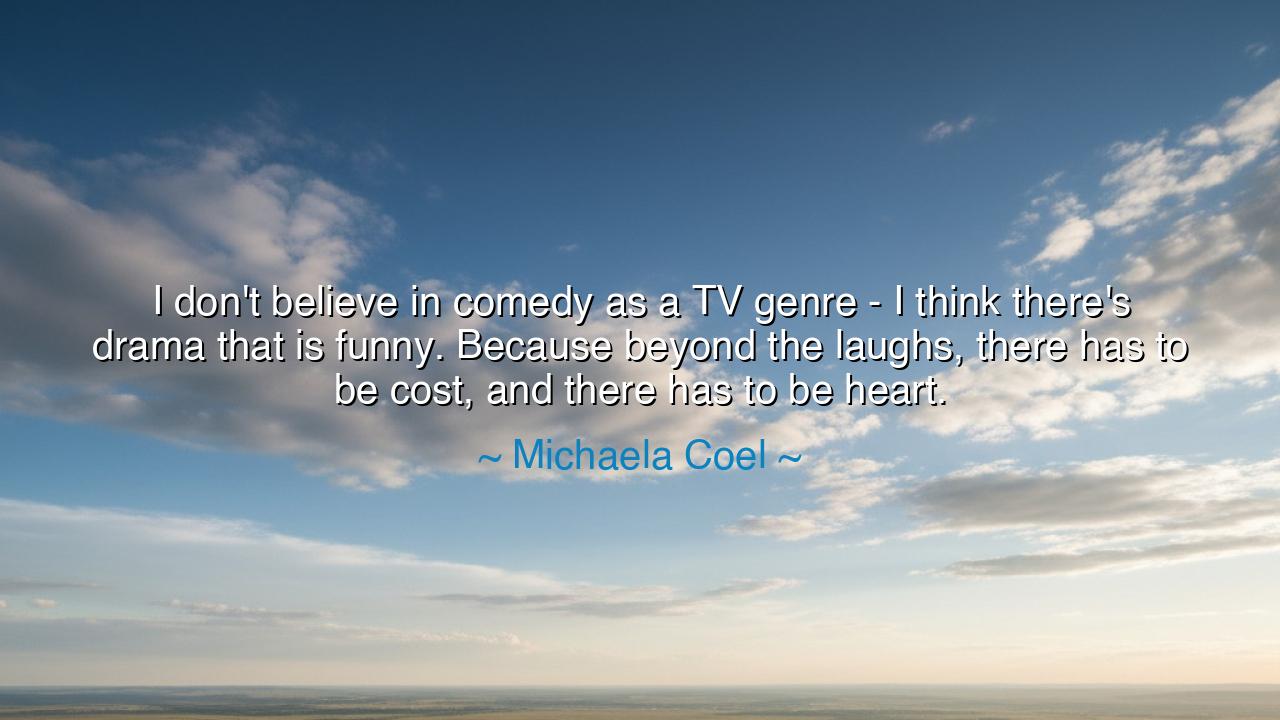
I don't believe in comedy as a TV genre - I think there's drama
I don't believe in comedy as a TV genre - I think there's drama that is funny. Because beyond the laughs, there has to be cost, and there has to be heart.






The words, “I don’t believe in comedy as a TV genre – I think there’s drama that is funny. Because beyond the laughs, there has to be cost, and there has to be heart,” were spoken by Michaela Coel, the visionary writer, actor, and creator whose work has redefined what storytelling can be. In these words lies a truth both ancient and profound: that laughter and sorrow are not opposites, but companions, and that every story worthy of life must contain both. Coel, who has walked through hardship and turned it into art, reminds us that comedy, stripped of truth and emotion, becomes hollow—and that the highest form of humor is born not from frivolity, but from understanding the human heart.
To the ancients, this union of joy and pain was sacred. The Greek playwrights knew that no comedy could truly live without tragedy’s shadow. Aristophanes, the great master of laughter, used wit to unmask hypocrisy and folly, yet beneath his jest lay the ache of a city at war, a people divided. His plays were not mere entertainment—they were acts of truth-telling wrapped in laughter. So too does Michaela Coel speak as one of those ancient storytellers reborn in our time. She knows that for laughter to endure, it must grow from the soil of experience, from the cost of being human. Every laugh that moves us must first touch something real, something vulnerable, something we recognize as our own reflection.
When Coel speaks of “cost”, she speaks of the price paid by every artist who tells the truth, and by every soul who dares to feel. There is no joy without the risk of heartbreak, no humor without the sting of reality. Her own works—such as I May Destroy You—weave laughter and pain so seamlessly that one forgets where one ends and the other begins. The characters she creates are not caricatures, but living beings, flawed and fragile. Their laughter does not erase their wounds; it becomes a means to survive them. In this way, Coel reminds us that the truest art—and indeed, the truest life—must hold heart at its center.
Consider the story of Charlie Chaplin, the great silent comedian of the early 20th century. Beneath his bowler hat and slapstick humor lay a heart heavy with the knowledge of poverty, loneliness, and injustice. His films made the world laugh, yet those same laughs carried the sorrow of humanity’s struggle. In The Great Dictator, Chaplin’s comedy becomes a cry for dignity amid tyranny; in City Lights, his clown’s smile masks an ocean of compassion. His laughter had cost, and it had heart—just as Michaela Coel describes. It was not escapism; it was redemption.
Coel’s wisdom also speaks to a generation that often seeks comfort in irony and detachment. She reminds us that art must not fear sincerity. A joke that asks nothing of us, that costs nothing, that risks no truth, fades quickly into the noise of the world. But a story that dares to be both funny and vulnerable, joyful and bruised—that story endures. “Beyond the laughs,” she says, “there has to be heart.” In those few words, she captures the essence of all meaningful creation: that laughter should not distract us from life, but deepen our understanding of it.
To live by this wisdom is to see the sacred in both joy and struggle. When you laugh, remember the weight of what it means to be alive; when you grieve, remember that laughter still waits nearby. Life is not a clean separation of emotions, but a tapestry woven from both. Coel teaches that the finest comedy does not mock pain but honors it, transforming it into something bearable, even beautiful. The laughter that follows is not shallow—it is the laughter of survival, of gratitude, of recognition.
So, my child, take this teaching into your own life: let your humor have depth, and let your heart have courage. Do not hide from your pain, for it will become the soil of your joy. When you tell your story—whether through words, deeds, or art—do not aim only to entertain; aim to reveal. Speak with heart, and do not fear the cost of honesty. For as Michaela Coel teaches, it is only through the marriage of laughter and truth that we create something timeless.
And remember this final truth, passed down through the ages: the human spirit is both fragile and fierce, both tragic and divine. The stories that endure are those that show us both faces at once—the laughter that heals, and the tears that cleanse. Comedy and drama are not rivals—they are the two halves of our humanity. To live fully, to create meaningfully, is to hold them both in your heart, and to let them sing together in the song of life.






AAdministratorAdministrator
Welcome, honored guests. Please leave a comment, we will respond soon